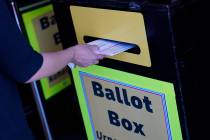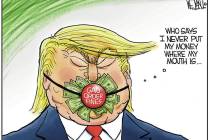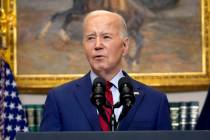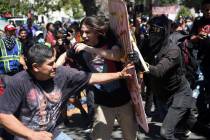No secret divorces
The language in Nevada's statute covering divorce trials is clear and unambiguous. Just perhaps, therein lies its flaw.
It says: "In any action for divorce, the court shall, upon demand of either party, direct that the trial and issue or issues of fact joined therein be private."
Not much wiggle room for parsing the language and finding a loophole through which an openness argument can be made.
Shortly after Gov. Jim Gibbons filed for divorce from first lady Dawn Gibbons, his attorneys invoked the statute and the judge immediately sealed the case as required.
But Dawn Gibbons' attorney Cal Dunlap in a motion this past week to void the sealing order raises some fundamental concerns about the constitutionality of the law itself. He cites federal case law, the First and 14th Amendments and a similar case out of California to underpin his argument.
The language in the 14th Amendment lays the groundwork pretty well, because this post-Civil War amendment extended to the various states all the established prohibitions against the federal government to deny rights.
"No State shall make or enforce any law which shall abridge the privileges or immunities of citizens of the United States; nor shall any State deprive any person of life, liberty, or property, without due process of law; nor deny to any person within its jurisdiction the equal protection of the laws," it reads.
Depriving property without due process and equal protection? Can a divorce trial conducted in utter secrecy guarantee due process? Arguably not. And there certainly is no "equal" protection under the law when one party can petition for a secret trial without giving the other party an opportunity for even a hearing.
One of Dunlap's more intriguing arguments is actually out of a California divorce case in which a similar law was, in fact, declared invalid on constitutional grounds. California case law does not necessary carry a lot of weight in Nevada, but the successful arguments there relied heavily on federal cases.
The California law was less sweeping. It allowed the sealing of any pleadings listing financial assets or liabilities. Sounds reasonable. But it had the effect, as a judge noted, of sealing an entire 100-page pleading if a single footnote contained a home address.
In 2005, Los Angeles Superior Court Judge Roy Paul ruled the statute is "not unconstitutional merely because it deprives the court of discretion as to what should be sealed, but because as enacted it seals the entirety of a pleading if any of the specified materials are included in it."
Dunlap noted, "The broad brush sealing authorized in the applicable Nevada statutes is even more blatantly unconstitutional in light of the fact that, unlike the California statute, there is not even a particular privacy interest such as confidential financial information identified in either statute."
The arguments the attorney makes are markedly similar to those I heard while sitting in on those discussions by a Supreme Court panel that established rules for when courts may seal records or close courtrooms. The single-party divorce sealing was mentioned a couple of times, but the judges and lawyers and journalists largely agreed it could not be touched except by the Legislature.
But Dunlap cites a federal case commonly referred to as NBC Subsidiary that found mandatory sealing rules are permissible only when there is "an overriding interest," "a substantial probability of prejudice," "it is narrowly tailored" and "no less restrictive means is available."
The Nevada law, prima facie, fails to meet any of those criteria.
Dunlap also makes an interesting argument as to the relative weakness in power of one party to the other, an argument that strikes to the equal protection clause. The divorce was originally filed in Carson City, where, as the attorney so noted, the governor "had a 50/50 chance of drawing a judge whom he had recently appointed." That might have required Dawn Gibbons to waste her only peremptory challenge.
I'm not sure whether the first lady's attorney will prevail, but a compelling argument has been put before the bench. If nothing else, our lawmakers should read the motion and see how unfair the current law is.
It could be fixed by applying the rules set out in the NBC case.
Thomas Mitchell is editor of the Review-Journal and writes about the role of the press and access to public information. He may contacted at 383-0261 or via e-mail at tmitchell@reviewjournal.com.























